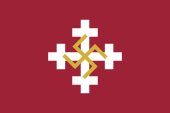Perkonkrusts
|
Thunder Cross
Pērkonkrusts |
|
|---|---|
| Leader | Gustavs Celmiņš |
| Founded | 1933 |
| Dissolved | 18 August 1941 |
| Newspaper | Pērkonkrusts |
| Paramilitary wing | Gustava Celmiņa triecienniekiem (GCT) (Greyshirts) |
| Membership (1934) | 2,000 - 5,000 |
| Ideology |
Latvian nationalism Fascism Anti-Semitism Anti-Germanism |
| Political position | Far-right |
| Colors |
Red Grey (customary) |
| Party flag | |
 |
|
Pērkonkrusts (Latvian pronunciation: [ˈpeːr.kon.krusts], "Thunder Cross"), was a Latvian ultra-nationalist, anti-German and antisemitic political party founded in 1933 by Gustavs Celmiņš, borrowing elements of German nationalism—but being unsympathetic to German National Socialism at the time—and Italian fascism. It was outlawed in 1934, its leadership arrested, and Celmiņš eventually exiled in 1937. Still-imprisoned members were persecuted under the first Soviet occupation; some collaborated with subsequently invading Nazi Germany forces in perpetrating the Holocaust. Pērkonkrusts continued to exist in some form until 1944, when Celmiņš, who had initially returned to work in the occupying German administration, was imprisoned.
Following the restoration of Latvia's independence in 1991, a new radical nationalist movement, also called Pērkonkrusts, was formed in 1995. The organization espouses many of the same values as its predecessor. Members have participated in efforts to bomb the Monument to the Liberators of Soviet Latvia and Riga from the German Fascist Invaders several times, leading to the arrest, trial and imprisonment of many of its members.
Pērkonkrusts has been variously categorised by scholars as representing the radical right, "activist nationalism" (Latvian: aktīvais nacionālisms), or fascism, with the latter term being the most commonly encountered in the scholarly literature.Roger Griffin, a prominent fascist studies scholar, describes Pērkonkrusts as having been a "small but genuine fascist opposition" which "pursued a revolutionary solution to the [economic] crisis and which would turn Latvia into an authoritarian state based on a new élite with a new corporatist economy", with its politics defined by "integralist nationalism". Building on Griffin's definition of generic fascism, a categorisation of Pērkonkrusts as "anti-German national socialism" has also been proposed in an article from 2015.
Aside from the party's newspaper, Pērkonkrusts (1933–34), the main source of information on the political platform of Pērkonkrusts can be found in the 1933 brochure, Pērkonkrusts: What Is It? What Does It Want? How Does It Work? (Latvian: Kas ir? Ko grib? Kā darbojas? Pērkonkrusts). This publication not only outlined the movement's political programme, but also included the complete party statutes.
...
Wikipedia
